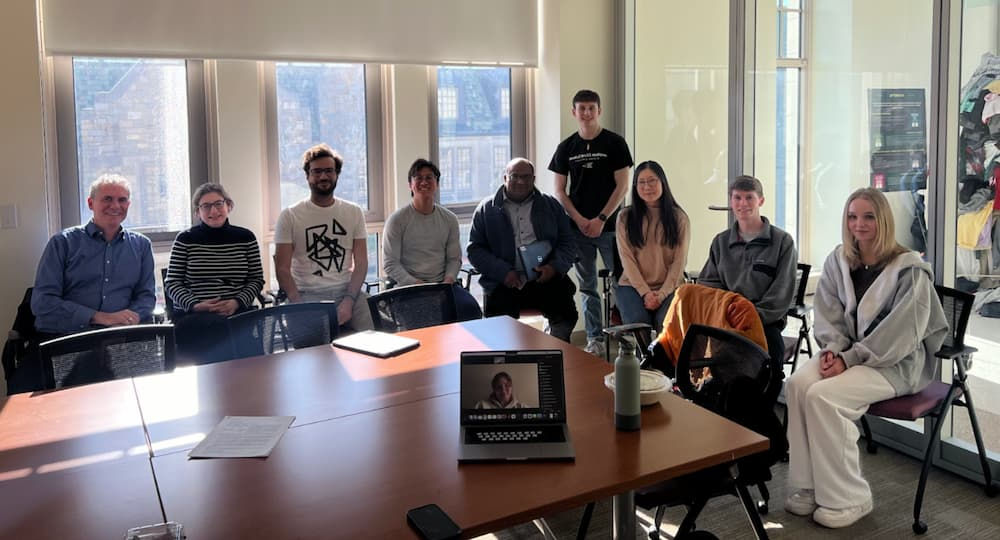EWB’s Past, Present, and Path Ahead
By Hayoung Cho | May 2025
Before beginning their freshman year at Boston College, Margaret Hynes, Maria Fernanda De Nadai, and Hayoung Cho connected virtually to launch a student-led initiative dedicated to partnering with communities to meet basic human needs and lay foundations for opportunity, sustainability, and resilience. Together, they co-founded the Boston College Engineers Without Borders (EWB) Chapter under the generous sponsorship of the Schiller Institute for Integrated Science and Society and with mentorship from the Boston Professional Chapter of EWB. The chapter has also been supported by Kaley McCarty, Laura J. Steinberg, Gregory Adelsberger, Siddhartan Govindasamy, and Amin Mohebbi.
EWB is a global network of student and professional volunteers who collaborate with under-resourced communities, both locally and internationally, to design and implement sustainable, climate-conscious infrastructure. Guided by community voices and rooted in mutual respect, EWB projects address essential needs such as access to clean water, energy, and sanitation, while fostering leadership and engineering skills in all participants. With a commitment to ethical partnership, safety, and long-term impact, EWB empowers communities to lead lasting change and build a more resilient future.

The Boston College EWB Chapter embodies the Jesuit tradition of service and being men and women for others. Over the past four years, the chapter has explored both domestic and international project opportunities. The first was the Middlesex CECorps Project, where they were introduced to a two-story timber-frame church design, incorporating plumbing, mechanical, and electrical systems based on a pro bono sketch. The second was the Mashpee Food Sovereignty Irrigation Project, which aimed to construct a pressurized irrigation system. The system would meet the water demand of a newly built facility to support the Mashpee Wampanoag Tribe’s farm. While BC EWB did not formally adopt these projects, they gained experience in sustainable design and community collaboration.
With guidance from faculty mentors such as Ethan Sullivan, Amy LaCombe, Sandra Waddock, James Keenan, and Glenn Gaudette, the chapter has explored interdisciplinary perspectives on engineering design, enriching its approach and its ability to serve communities with technical skill and ethical commitment. The BC EWB Chapter is proud to announce its official adoption of the Mkutani, Tanzania Borehole Project, in collaboration with the Boston Professional Chapter.
This project, situated near the Mkutani Primary School, involves drilling a borehole to a depth of up to 140 meters. It follows a previous borehole drilled in May 2016 and will serve as the final step in establishing a reliable clean water source for the village. The scope includes excavation, piping and fittings installation, flow meter integration, backfilling, constructing and equipping distribution boxes, and full system testing. Once completed, the borehole will eliminate the need for villagers to walk long distances to access clean water, significantly improving daily life and public health. Furthermore, placing the facility adjacent to the primary school would encourage children’s attendance. The team has been working diligently to raise $25,000 and design the borehole using AutoCAD, under the supervision of the Boston Professional Chapter. They plan to travel to Mkutani with members of the Professional Chapter and the MIT Student Chapter.

The BC EWB Chapter co-led the first-ever Boston Student Engineers Without Borders Conference on April 12, 2025, showcasing the power of student leadership and intercollegiate collaboration. Co-led by current President Hayoung Cho, along with incoming Co-Presidents Ava West and Bennett Lewis and incoming Vice President Asad Faqirzada, the event welcomed students from Tufts University, Northeastern University, and Boston University to exchange ideas, build partnerships, and engage with a series of guest speakers. Presenters included Britta Johnston working on global health initiatives in Uganda, Emily Derrig on land surveying, Abeeha Bhatti on creating picture books to inspire children in Kenya about engineered filtration systems, Gordon Wallace on his work in Zambia, Michael Stover on advancing equitable access for Native American tribes in the U.S, Glenn Gaudette and his vision of collaborative engineering service projects, and Franklyne Kirui and Norman Mugisha from Kenya. Looking ahead, the BC Chapter aims to continue inspiring students and supporting community-led projects in collaboration with neighboring chapters.
Most recently, the BC EWB Chapter was invited to the EWB Senior Gathering in New York City, hosted by Uma Lakshman, President of the EWB-NY Professional Chapter. Hayoung connected with EWB students from Harvard University, the City College of New York, Stevens Institute of Technology, the University of Vermont, and Rensselaer Polytechnic Institute. The gathering provided a meaningful opportunity to reflect, celebrate the year's accomplishments, and strengthen ties across chapters.
As Hayoung prepares to graduate, she reflects on her time at Boston College and with Engineers Without Borders as a defining chapter in her college experience. EWB has given her strong technical experience in engineering design and project coordination, deepening her understanding of ethical leadership and the value of community-based solutions. She is especially grateful for the friendships formed, the mentors who guided her, and the communities who welcomed her with trust and collaboration. She is thankful to all those who contributed to the founding of EWB, including Nora Alwash, Vera Hernandez, Mary Loeb, Anne Scott, and Caleb Lee. She looks forward to the upcoming projects EWB will pursue, including a collaborative greenhouse initiative with the Plant Club to cultivate native Tanzanian plant species. The Mkutani, Tanzania Borehole Project exemplifies the chapter’s perseverance, and she eagerly anticipates its lasting impact in Tanzania and beyond.




